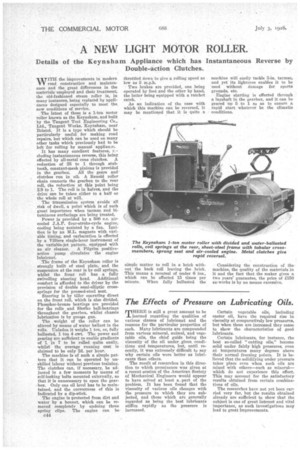The Effects of Pressure on Lubricating Oils.
Page 66

If you've noticed an error in this article please click here to report it so we can fix it.
TIECERE is still a great amount to be learned regarding the qualities of various classes of lubricant and the reasons for the partieular properties of each. Many lubricants are compounded from various mineral, animal, and vegetable oils, the chief guide being the viscosity of the oil under, given conditions and temperatures, but, until recently, it was extremely difficult to say why certain oils were better as lubricants than others.
The result of researches in this direction to which prominence was given at a recent session of the American Society of Mechanical Engineers would appear to have solved at least a. part of the problem. It has been found that the viscosity of various oils changes with the pressure to which they are subjected, and those which are generally regarded as being the best lubricants stiffen rapidly as the pressure is increased. Certain vegetable oils, including castor oil, have the required rise in viscosity at comparatively low pressures, but when these are increased they cease to show the characteristics of good lubricants.
Certain lubricants, for instance, the best so-called "cutting oils," become solid under fairly high pressures, even at temperatures many degrees above their normal freezing points. It is believed that the solidifying under pressure takes place even when such oils are mixed with others—such as mineral— which do not experience this effect. This may account for the satisfactory results obtained from certain combinations of oils.
The researches have not yet been carried very far, but the results obtained already are sufficient to show that the subject is one of great interest and vital importance, as such investigations may lead to great improvements.












































































































